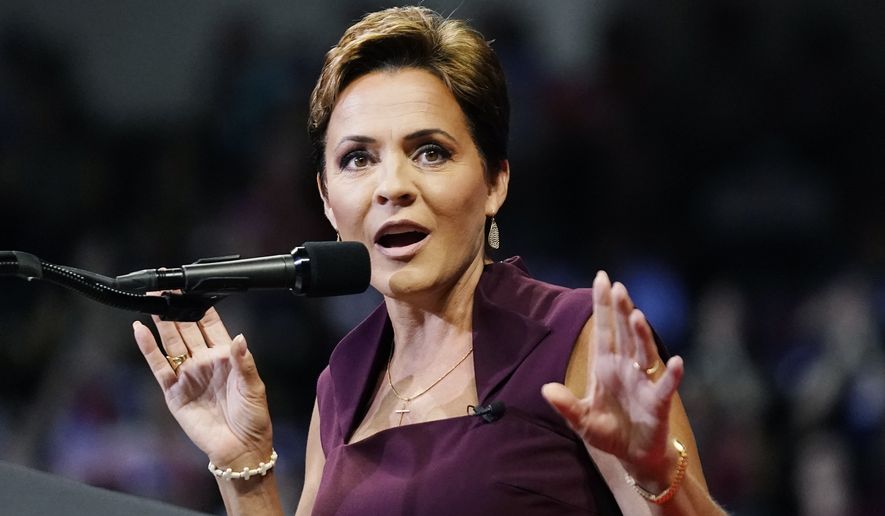The Democrats’ plan to bankroll MAGA Republicans in the primaries to tee up easy victories in the general elections blew up in their faces with some of those “unelectable” Trump-backed candidates headed for victory.
In Arizona, Republican Kari Lake, boosted by Democrats in the Aug. 2 Republican primary, is leading Democrat Katie Hobbs in the governor’s race by several percentage points.
In New Hampshire, Senate Democrats helped Republican Don Bolduc onto the general election ballot, and he now has closed in on Democratic incumbent Sen. Maggie Hassan.
“They’ll have to answer to their liberal donors whose financial resources were spent propping up a formidable Republican candidate,” said Bolduc spokeswoman Kate Constantini. “In a change vs status quo election, outsider candidates like General Bolduc are poised for success, especially against a lackluster and out-of-touch incumbent like Senator Hassan.”
Ms. Lake and Mr. Bolduc are among several examples of midterm meddling by Democrats who spent money in the primaries to help put Trump-endorsed “extreme” Republicans on November ballots to fire up the Democratic base and win over independents and even some Republicans weary of the former president.
Yet the Trump-endorsed candidates aren’t failing according to plan. They are closing in and even winning in battleground races.
Ms. Lake, a former Phoenix television news anchor, has pulled several points ahead of the Democratic nominee for governor, Secretary of State Katie Hobbs. Ms. Lake made it on the November ballot with some help from Arizona Democrats, who days before the primary sent out “a warm thank you” to Ms. Lake’s Republican opponent, Karrin Taylor Robson, “for her longtime financial support to help elect Democratic candidates.”
Senate Majority PAC, which is aligned with Senate Majority Leader Charles E. Schumer of New York, spent $3.2 million on ads that essentially boosted the candidacy of Mr. Bolduc, a retired Army brigadier general and Trump-backed conservative, in the New Hampshire Republican primary. The PAC ran ads portraying Mr. Bolduc’s moderate Republican opponent, state Senate President Chuck Morse, as “another sleazy politician” bound to the Republican Washington establishment.
Mr. Schumer wants to expand his caucus’ grip on the evenly split Senate and calculated that a Trump-backed candidate would have no chance of defeating an incumbent Democrat in New Hampshire.
Mr. Bolduc is now tied with Ms. Hassan, according to several polls.
According to the University of New Hampshire Survey Center, Ms. Hassan has 50% among likely voters in its poll released Sunday evening, while Mr. Bolduc stood at 48%. Libertarian Party candidate Jeremy Kauffman picked up 1%, and 1% supported someone else or were undecided.
Ms. Hassan previously held an 8-point lead over Mr. Bolduc in UNH’s poll conducted in September.
Her 2-point lead over the retired general is within the survey’s sampling error of 2.1 percentage points. Mr. Bolduc’s campaign told The Washington Times that it was clear the Democrats made a bad bet.
A longtime Democratic operative in Washington said the strategy was “definitely risky.”
“It undercuts the urgency of Biden going out and giving these two big speeches about democracy being on the ballot then having at least some democratically aligned groups supporting candidates who are 2020 election deniers,” said the operative, not wanting to be identified talking about the party’s missteps. “Voters have a very short attention span, and they won’t remember it or think about it.”
House Democrats, through the Democratic Congressional Campaign Committee, targeted Republican primaries to try to prop up Trump-endorsed candidates through ad buys, including Michigan Republican John Gibbs, who is in a competitive race with Democrat Hillary Scholten in the state’s 3rd Congressional District.
Despite the Democratic attacks on Mr. Gibbs as an “extremist,” political analysts show Ms. Scholten as only slightly favored in the race, while both sides acknowledge that the election is close.
Democrats bankrolled other Republican candidates in the primaries. According to a Washington Post analysis, the party spent nearly $53 million in nine states in primaries this cycle to amplify conservative Republican candidates, who they viewed as easier to beat.
Of the 13 congressional and gubernatorial primaries where Democrats intervened to help their Republican of choice win, six made it out of the primary.
A Democratic political action committee spent nearly $100,000 to boost Trump-endorsed conservative Robert Burns in New Hampshire’s Republican primary for the state’s 2nd Congressional District. He won the primary but isn’t as easy to defeat as Democrats had hoped. A poll last week showed Mr. Burns ahead of incumbent Ann McLane Kuster by 1 point, although other polls show Mrs. Kuster up by 8 points.
Mr. Schumer’s Senate Majority PAC funded TV ads for the unsuccessful campaign of conservative state Rep. Ron Hanks over businessman Joe O’Dea in the Republican Senate primary in Colorado.
Despite the ads, Mr. O’Dea won the race by a 9-point margin. He is now facing off against Democrat incumbent Sen. Michael Bennet. Real Clear Politics has shifted its prediction of the race from lean Democrat to “toss-up.”
• Kerry Picket can be reached at kpicket@washingtontimes.com.




Please read our comment policy before commenting.